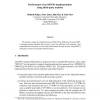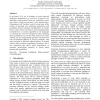164 search results - page 4 / 33 » The Future Is Parallel But It May Not Be Easy |
MSS
2000
IEEE
14 years 27 days ago
2000
IEEE
We present a unique new implementation of MPI-IO (as defined in the recent MPI2 message passing standard) that is easy to use, fast, efficient, and complete. Our implementation ...
SIGCSE
1997
ACM
14 years 21 days ago
1997
ACM
Parallelism and concurrency have long been considered as non essential during the cursus of the average programmer. However, thanks to technological advances, new promising forms ...
ACSC
2008
IEEE
14 years 3 months ago
2008
IEEE
In the future, if we are to continue to expect improved application performance we will have to achieve it by exploiting course-grained hardware parallelism rather then simply rel...
IPPS
2006
IEEE
14 years 2 months ago
2006
IEEE
Parallel programming is facilitated by constructs which, unlike the widely used SPMD paradigm, provide programmers with a global view of the code and data structures. These constr...
PADL
2011
Springer
12 years 11 months ago
2011
Springer
Modern challenges led to a design of a wide range of programming models for reactive, parallel and concurrent programming, but these are often t to encode in general purpose langua...


